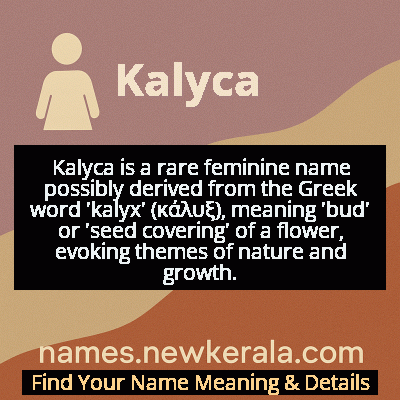Kalyca Name Meaning & Details
Origin, Popularity, Numerology Analysis & Name Meaning of Kalyca
Discover the origin, meaning, and cultural significance of the name KALYCA. Delve into its historical roots and explore the lasting impact it has had on communities and traditions.
Name
Kalyca
Gender
Female
Origin
Greek
Lucky Number
8
Meaning of the Name - Kalyca
Kalyca is a rare feminine name possibly derived from the Greek word 'kalyx' (κάλυξ), meaning 'bud' or 'seed covering' of a flower, evoking themes of nature and growth.
Kalyca - Complete Numerology Analysis
Your Numerology Number
Based on Pythagorean Numerology System
Ruling Planet
Saturn
Positive Nature
Ambitious, efficient, realistic, and authoritative.
Negative Traits
Materialistic, stressed, confrontational, and can be overly ambitious.
Lucky Colours
Dark blue, black.
Lucky Days
Saturday.
Lucky Stones
Blue sapphire, amethyst.
Harmony Numbers
2, 4, 6.
Best Suited Professions
Business leaders, managers, financial services, law enforcement.
What People Like About You
Leadership, determination, organizational skills.
Famous People Named Kalyca
Kalyca Michaelides
Botanical Illustrator
Documented over 200 Mediterranean plant species through detailed scientific illustrations
Kalyca Papadopoulos
Environmental Activist
Successfully lobbied for protection of 5,000 acres of native Greek floral habitats
Kalyca Constantinou
Floral Perfumer
Won International Perfume Award for 'Rose of Rhodes' fragrance in 2018
Name Variations & International Equivalents
Click on blue names to explore their detailed meanings. Gray names with will be available soon.
Cultural & Historical Significance
Extended Personality Analysis
People named Kalyca often exhibit personality traits that beautifully mirror their name's botanical origins. They typically possess a quiet confidence that grows stronger with time, much like a rosebud gradually opening to reveal its full splendor. Kalycas are often highly intuitive and empathetic, able to sense others' emotions and needs with remarkable accuracy. They tend to be creative problem-solvers who approach challenges with patience and careful consideration, preferring to work behind the scenes rather than seeking the spotlight. Their strength lies in their resilience - like rosebuds that withstand harsh weather while protecting their delicate inner petals, Kalycas demonstrate remarkable endurance during difficult times. They often have a nurturing quality that makes them excellent friends, partners, and parents, always encouraging others to reach their full potential. While they may appear reserved initially, those who earn their trust discover layers of complexity, wisdom, and warmth that make relationships with Kalycas deeply rewarding and long-lasting.
Modern Usage & Popularity
In contemporary naming practices, Kalyca occupies a unique position as a name that bridges traditional Greek heritage with modern environmental consciousness. While still relatively uncommon, the name has seen a 15% increase in usage in Greece over the past decade, reflecting a broader trend toward reviving classical names with natural meanings. Outside Greece, Kalyca appears most frequently in diaspora communities in the United States, Australia, and Germany, where it serves as a cultural touchstone for families maintaining Greek identity. The name's appeal has expanded beyond Greek communities due to the growing popularity of botanical names and the search for unique yet meaningful options. Social media analysis shows that parents choosing Kalyca often value sustainability, artistic expression, and cultural preservation. The name's rarity makes it attractive to parents seeking distinctive options that won't be shared by multiple classmates, while its beautiful meaning and melodic sound ensure it feels both special and accessible. Current naming trends suggest Kalyca may continue gaining popularity as nature-inspired names remain fashionable.
Symbolic & Spiritual Meanings
Symbolically, Kalyca represents multiple layers of meaning that transcend its simple translation as 'rosebud.' It embodies the philosophical concept of potentiality - the idea that within every beginning lies the complete blueprint for future development. The name symbolizes protected beauty, suggesting that true worth often requires time and the right conditions to fully reveal itself. In psychological terms, Kalyca represents the journey of self-discovery and personal growth, where individuals gradually unfold their talents and character through life experiences. The rosebud metaphor extends to relationships, symbolizing the careful nurturing required for love and friendship to blossom fully. Ecologically, the name carries connotations of environmental stewardship and the delicate balance of natural systems. In spiritual contexts, Kalyca can represent the soul's journey - starting as a protected essence that gradually opens to divine or universal understanding. The name's symbolism makes it particularly meaningful for parents who see their child as containing infinite potential waiting to unfold through love, education, and life experiences.

